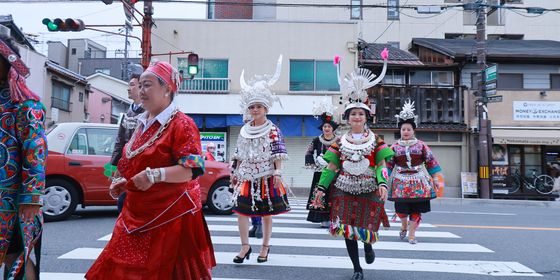Send in this character to the rescue
“The alarm comes at dawn/ At night, we reinforce the Great Wall (朝来羽书急,夜救长城窟),” wrote the poet Zhangsun Zuofu (长孙佐辅) in the eighth century of the high-strung border defenses of the Great Tang empire (618 – 907).
The character 救, meaning “rescue” or “save,” is formed by the radical 求 (qiú) meaning “to ask for” on its left side and the radical 攵 (pū), on the right, meaning “to tap.” This combination literally implies insistently asking for help from others. It appears as in bronze inscriptions, using the older forms of 求 and 攵 (primitively written as 攴). This combination has remained unchanged for thousands of years.
One of the earliest appearances of the character is in the Book of Songs (《诗经》), a collection of poetry from the eleventh to sixth century BCE: “Whenever my neighbors are in need, I’ll offer help in word and deed (凡邻有丧,匍匐救之).”
However, the more popular ancient meaning of 救 was “to stop” or “to prevent,” as in the term “救火 (jiùhuǒ, to stop a fire),” first found in the Intrigues of the Warring States (《战国策》) in the first century BCE. Linguist Xu Shen (许慎) from the Eastern Han dynasty (25 – 220) wrote in his Analytical Dictionary of Chinese Characters (《说文解字》): “救 is the action of stopping (救者,止也).” A passage in The Analects of Confucius (《论语》) describes how Confucius and his followers prevented the noble Ji family from violating royal etiquette: “The head of the Ji family was going to make offerings at Mount Tai [something only monarchs can do]. The Master said to his disciple Ran You, ‘Can’t you stop him?’ (季氏旅于泰山,子谓冉有曰:女弗能救与?).”
Though this ancient meaning is not as popular nowadays, it is preserved in words like “救火” and “救灾 (jiùzāi, to stop a disaster).” The proverb “抱薪救火 (bàoxīn jiùhuǒ, stopping a fire by adding firewood)” means to tackle a problem the wrong way and cause the opposite effect.
Today, the character more frequently describes saving or helping others, often from emergencies like illnesses, accidents, and natural disasters. It can be found in the names of many public institutions that engage in rescue or charitable work.
During the worst of China’s Covid-19 pandemic, medical and other pandemic relief workers from across the country, known as “救护人员 (jiùhù rényuán, rescue workers)” or “救援人员 (jiùyuán rényuán),” were sent to the center of the outbreak in Hubei province to conduct “救援行动 (jiùyuán xíngdòng, relief operations).” There, they managed to “救治 (jiùzhì, cure)” many patients, who saw their conditions “救转 (jiùzhuǎn, improve).” Doctors often say they have a responsibility to “救死扶伤 (jiùsǐfúshāng, to treat the injured and stop death).”
The medical field and disaster relief are not the only areas when one saves or helps others. When a war breaks out, reinforcements, or “救兵 (jiùbīng),” may be sent out to relieve soldiers who are already on the battlefield. In costume dramas, the emperor is often surrounded by vassals who say it’s their responsibility to “救驾 (jiùjià, protect the emperor).”
In acting and sports, 救 also comes to the rescue in awkward or embarrassing situations. The term 救场 (jiùchǎng), “to save a performance” or “save a match,” refers to replacing an actor, athlete, or coach when they can’t do their jobs due to illness or injury—or just incompetence. The substitutes are called “救火队员 (jiùhuǒ duìyuán),” literally “firefighting team members.” When a coach sends in new players to turn a troubled match around, sports commentators may try to drum up suspense by saying, “让我们看看救火队员能否成为奇兵 (Ràng wǒmen kànkan jiùhuǒ duìyuán néngfǒu chéngwéi qíbīng. Let’s see whether the substitutes can perform a miracle).”
In the financial sector, when the economy suffers heavy damage, such as China’s did after the pandemic, the government or central bank may take measures known as “救市 (jiùshì, saving the market)” by issuing financial subsidies to revive the economy and build up investors’ confidence. In the aftermath of the global 2008 Financial Crisis, many headlines announced, “中央政府推出4万亿资金救市 (Zhōngyāng zhèngfǔ tuīchū sì wànyì zījīn jiùshì. Central government allocates 4 trillion in funds to save the economy).”
Another meaning of 救 is “to correct.” The Book of Rites (《礼记》), a Confucian classic, stated, “If a teacher can truly understand the inner thoughts of his students, then he can better correct their mistakes (知其心,然后能救其失也).” This meaning, though, is usually only found in literary works. In the Northern Song dynasty (960 – 1127), the literatus Shao Bowen (邵伯温) wrote in praise of Yao Chong (姚崇), a talented minister from the previous dynasty, “No one was devoted to correcting social problems like him (医时救弊,无出于斯 Yīshí jiùbì, wú chū yú sī)!” In doing so, he subtly criticized the destruction wrought by radical reformists in his own era.
As a Chinese proverb goes, “Saving a person’s life is more worthy than building a seven-story pagoda (救人一命,胜造七级浮屠 jiùrén yí mìng, shèngzào qī jí fútú).” Though good deeds are worth praising, it’s important to respect one’s own limits and apply professional knowledge when trying to “救人 (jiùrén, save or help a person),” instead of blindly following the principle of “舍己救人 (shějǐ jiùrén, saving others without regard to oneself).” Otherwise, you might end up being “自救不暇 (zìjiù bùxiá)”—so busy helping others that you have no time to help yourself.
On the Character: 救 is a story from our issue, “Disaster Warning.” To read the entire issue, become a subscriber and receive the full magazine.













